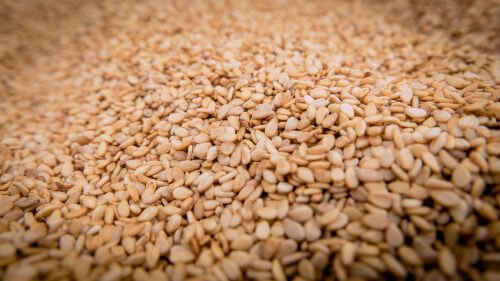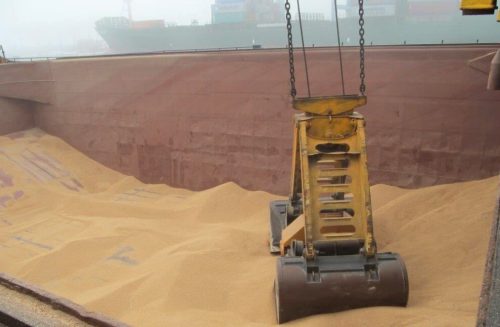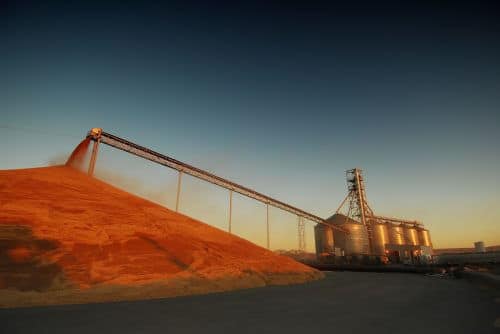Millions of tons of seeds for industry and fodder are imported to Israel every year, and harmful and invasive weed seeds infiltrate them. This is a real danger to agriculture and nature in Israel - and so far no sufficient steps have been taken to deal with the problem

By Orlev Tsekh, Zveta, Science and Environment News Agency
Traffic in Israel's ports is bustling. In Israel's seaports, more than 36 million tons of goods were unloaded last year. Among other things, 355 cars were unloaded, 884 containers were unloaded at the docks, and 189 passengers passed through them. But among the shiny cars and the huge cranes, there are hidden some containers that bring unwanted guests to Israel - and without proper supervision.
"Millions of tons of seeds that are imported for industry and fodder are not tested satisfactorily at all," explains agronomist Orit Cohen from Israel's official seed testing laboratory, which belongs to the Agricultural Research Administration - Volcani Institute. A sample survey initiated by Doron Bornstein of the plant protection and inspection services at the Ministry of Agriculture, plant quarantine unit at Ashdod Port with Cohen, shows that some of the huge import shipments of seeds for industry and fodder contain foreign weed seeds that are prohibited for import. The results of the survey and its conclusions were recently published in the journal "Ecology and Environment".
Invasive species at the back door
Not all seeds imported to Israel receive the same treatment. The first group, which receives preferential treatment, are seeds that are imported to Israel for propagation. This small elite group is intended for direct sowing of agricultural crops. These seeds undergo an in-depth inspection at several stations. The first - cleaning the seeds, determining the percentage of clean seeds and the percentage of foreign and harmful weed seeds. The second station - the germination rate, and the third - testing for diseases transmitted by seeds.
In contrast, about 4 million tons of seeds for fodder and industry, which arrive in Israel every year, are only partially tested and without emphasizing the presence of foreign seeds. These are seeds that are used as animal feed and as a raw material for the production of breads and oils, such as soybean and canola oil. Since the kernels are intended to be used as food for humans and livestock anyway, importers have no reason to invest in strict quality checks. But the low price of the seeds hides behind it the high environmental price, since in these shipments the chance of finding foreign and harmful weed seeds is much higher, as the study shows.
These days, the official seed testing laboratory deals with seeds for propagation only. But in order to warn of the danger in importing grains for industry and forage, Cohen, Bornstein, Galina Sidan and Leah Mazor conducted a one-time survey of grain shipments for industry and forage, in which 41 different shipments of wheat, barley, soy and corn were sampled. The seeds found were defined and classified into two groups: harmful seeds and foreign seeds that do not exist in Israel. And the results are extremely alarming: 46 percent of all samples contained harmful weed seeds and 53.8 percent contained weed seeds foreign to Israel. Some samples contained both categories.
The Great Seed Invasion
A perusal of the list of the foreign weed seeds discovered in the survey shows a disturbing picture: the leading species is creeping gorse, a noxious and invasive weed in more than 40 countries, which was discovered in 17 percent of the samples; Hallablov, which is found in 12 percent of them; Hops of the fields, a complete parasite that has already established itself in the country, and was found in the survey in large quantities; the field thistle, a known pest in Europe and America; And other species, such as ragwort and poppy, which have already been observed in Israel, unsurprisingly, on roadsides, in agricultural fields and along railroads. A comparison with samples of seeds for multiplication shows a huge gap in the presence of these seeds: in the survey of the seeds for multiplication, which are rigorously tested, their presence did not even reach one percent of the samples.

"Invasive seeds have different mechanisms that give them an advantage over native plants," explains Cohen. "Ambrosia, for example, spreads chemical substances in its environment and can eliminate entire fields. Hops is a parasitic plant, which feeds on the transport tubes of other plants. Unlike most cultivated plants, which can reproduce mainly through sexual reproduction, many of the invasive plants can also reproduce asexually, thereby increasing their chances of having offspring."
If that's not enough, the invading seeds have other ways to spread: in 2016, dozens of individuals of the field agrostem, a rare plant that does not belong to the area's flora, were found in barley fields in the Negev. It turns out that the barley, which was originally intended for fodder, was eventually used for sowing, apparently due to its low price, and with it came the rare plant, which is not native to the area.
Even when the fodder seeds are used for animal food, this is not the end of the story as far as the invasive seeds hiding among them are concerned. Research by Prof. Baruch Rubin from the Faculty of Agriculture at the Hebrew University He found that some of the weed seeds germinated even after passing through the cows' stomachs. Indeed, foreign species such as turnips and soy plants were found around dairy farms throughout the country, which were also found to be resistant to pesticides.
Trucks are full of kernels and lack any sealing
The inherent advantages of the invasive species, along with the lack of natural enemies, makes dealing with them extremely difficult. The great damage they cause, both in agriculture and among wild plants, has considerable economic and ecological consequences: the invasive species take over agricultural and wild areas, force to increase the use of pesticides and threaten local species and may even spread diseases. in the reportThe invasive species in Israel” of the Society for the Protection of Nature states that the annual cost of damages to agriculture in the US is estimated at more than 60 billion dollars per year.
If farmers have at least chemical methods to deal with the invading hazard, then the natural environment has no protection. Dr. Jean-Marc Dufour-Dror, who studies the invasive plants in Israel, reports on the takeover of the ambrosia grass collected on the banks of the Alexander River. In a survey by the Sharon Drainage Authority from 2004, it was found that the plant had invaded over 4,800 dunams. The continued monitoring shows that it continues to spread, and has already reached Nahal Dror - a tributary of Nahal Pulag. If its ability to spread is not enough, ragweed is also toxic and allergenic - a hazard to wild plants, cattle and humans.
A necessary step to fight against invaders is to prevent them from entering the country in the first place. Why is this not happening? "Importers have an interest in importing as much goods as possible for as little money as possible. Trucks full of seeds arrive at the port and lack any sealing except for a cloth cover on top, so seeds fall from the trucks and spread around the port," emphasizes Cohen. In his book "Invasive Plants in Israel" Dufour-Dror confirms the assertion and notes the establishment of invasive plants next to ports, railways and roads.

Doron Bornstein from the Plant Protection and Audit Services at the Ministry of Agriculture, one of the initiators of the research, explains the complexity of the issue. "It is not correct to say that nukes enter Israel without any supervision," he emphasizes. "There is a partial and limited visual inspection, which does not emphasize foreign and harmful seeds. It must be emphasized that it is difficult to apply the strict standards that exist in seeds for propagation to huge shipments of seeds, which originate in open fields. The enormous difficulty of limiting huge shipments and sampling them in a way that reflects reality, together with the much lower risk to the environment compared to material that is imported for multiplication, make it difficult to take steps in this matter."
"In 2011, a report was submitted on the subject, but nothing moved"
Orit Cohen has been working for 25 years in the Agricultural Research Administration. She conducted the survey with her partners to encourage regulation on the subject. Not surprisingly, no adequate budget was found for the survey and it was carried out on a limited scale only. "Government ministries pass the responsibility from one to the other," she says, "this despite the fact that a serious report has already been submitted on the subject by the Jerusalem Institute for Israel Research and the Nature and Parks Authority, and meanwhile we are lagging behind other developed countries."
The report, "Invasive alien species in Israel: assessment of the situation and alternatives for policy and regulation" By attorney Ronit Justo-Hanani, reviews the failures of the current policy and regulation regarding biological invasions. In the report, the place of importation in the problem of invasive species was not overlooked: "importation of foreign species is often guided by economic considerations that are concerned with maximizing profits and developing trade and economic sectors," it says. "In view of the lack of awareness and in the absence of an explicit intention, considerations of protecting biological diversity are not taken into account." The report also shows that the legal framework for restricting imports is insufficient and therefore subject to pressure from the importers, who are pushing for changes and flexibility in the regulations.
The report offers comprehensive recommendations for policy and regulation with reference to all the ways in which invasive species enter the country. However, at least on the subject of the import of the seeds, Cohen has a simple and clear recommendation: "We want a standard to be established for testing seeds for fodder and industry, and for them to be arranged samples like seeds for propagation. Applying the sample tests also to the seeds for fodder will make it possible to prematurely discover harmful weed seeds that pose a danger, and to reject problematic shipments."
In addition, Cohen and her partners recommend the construction of a joint plan by the Ministry of Environmental Protection and the Ministry of Agriculture, to prevent the entry of invasive species. This is through conducting long-term surveys, enforcing the regulations, building a database of findings and data transfer mechanisms and publishing the list of prohibited species to the general public. Thus, they hope, the next invasion will be avoided, which in the current situation is only a matter of time.
The Ministry of Environmental Protection stated in response:
"The Ministry of Environmental Protection sees great importance in maintaining and protecting the natural habitats and works for this. The study in question is known to the professionals at the Ministry of Environmental Protection, who have been negotiating with the Ministry of Agriculture for several months on the issue of reducing the risks of invasive species entering industry and fodder from nuclear plants.
"According to the view of the Ministry of Environmental Protection, these risks must be addressed within the framework of the regulations for the Animal Food Inspection Law (2014), to which the veterinary services of the Ministry of Agriculture are entrusted, and which are being formulated these days. The Ministry of Environmental Protection submitted its recommendations as part of the legal consultation and before the professional advisory committee for regulations.
"The main recommendations are: the risk assessment for the introduction of invasive species should be carried out as part of the risk assessment in the permit regulations. In addition, clear definitions are required for cleaning seeds from the importer. Also, the supervision and enforcement should be carried out by the plant protection services at the Ministry of Agriculture in coordination with the veterinary services, including sample tests at the entry points of the shipments."
See more on the subject on the science website:

One response
Tam's question - what is the meaning of the delays of years? It is environmental pollution and eliminated.
The fact that those who import have interests is not new.
The fact that the damages cost millions or billions is also not new.
Exactly the same with any other pollution - the interest of one comes before all others. And therefore they will also start to fine. Very quickly there will be pressure on the suppliers to sort better before it even reaches the inspection points here that it is already starting to pollute.
Because what is cheaper to bring from "there" instead of growing here, it will obviously be cheaper to have them work on sorting there. And this is only a fine for the size of the damage it can cause.
And if we don't give in huge shipments, then don't bring huge shipments. Where is the problem and why get tangled up in the wheels of bureaucracy?